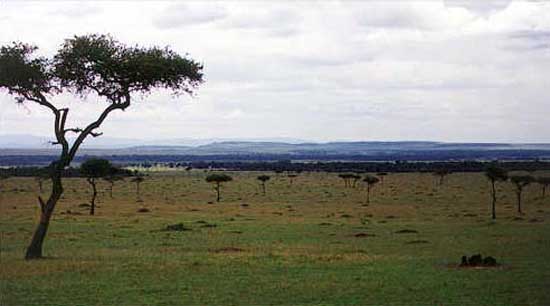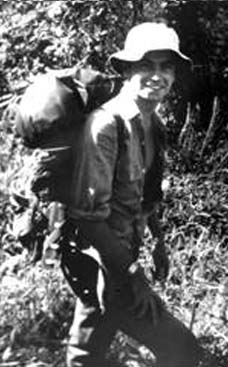2007.08.19: August 19, 2007: Headlines: COS - Kenya: Engineering: Science: IT: San Francisco Chronicle: Kenya RPCV Daniel Kohanski writes: Poorer nations get big lift from a little high tech
Peace Corps Online:
Directory:
Kenya:
Peace Corps Kenya :
Peace Corps Kenya: Newest Stories:
2007.08.19: August 19, 2007: Headlines: COS - Kenya: Engineering: Science: IT: San Francisco Chronicle: Kenya RPCV Daniel Kohanski writes: Poorer nations get big lift from a little high tech
Kenya RPCV Daniel Kohanski writes: Poorer nations get big lift from a little high tech

It doesn't always take a lot of high technology to compete in the modern world. It takes a little bit of it, plus a lot of ingenuity. In Kenya, there are fewer than half a million landlines for 37 million people, and most of them are business phones. But in the past few years, more than 6 million Kenyans have acquired cell phones. A reconditioned phone can cost less than $25. That is still a lot of money for those who live on a dollar or two a day, but they are cheap to use. A subscriber identity module card is less than a dollar; 8 cents will pay to send a short text message, and it costs nothing at all to receive one. This last part can be particularly useful in providing poor people with access to the information that they need to better their lives. Pride Africa, for example, a nonprofit based in Nairobi, Kenya, is developing a new system - DrumNet - to connect the players in the agricultural community via cell phones; I worked for them while I was in the Peace Corps. The idea is to connect the bankers, the farmers, the buyers and suppliers, so that information is easily exchanged among them.
Kenya RPCV Daniel Kohanski writes: Poorer nations get big lift from a little high tech
Poorer nations get big lift from a little high tech
Daniel Kohanski
Sunday, August 19, 2007
We in the West are accustomed to thinking of technology as being the latest thing. We line up for iPhone because we want the newest, coolest toy on the market. Anything else is so yesterday.
The developing world cannot afford that sort of luxury; instead, people there have access to current technology. Bank tellers may have flat-screen monitors; some stores, even in small towns, have barcode scanners; and there are Internet cafes everywhere. But the bulk of the population cannot afford these things.
They can, however, afford a mobile phone. It may not be new; many have been reconditioned, often poorly so. It's not an iPhone or a BlackBerry; it doesn't come with a camera, nor does it play games. There isn't always a clear signal, or electricity to charge it. Yet all over Africa, it is changing lives.
In Kenya, there are fewer than half a million landlines for 37 million people, and most of them are business phones. But in the past few years, more than 6 million Kenyans have acquired cell phones. A reconditioned phone can cost less than $25. That is still a lot of money for those who live on a dollar or two a day, but they are cheap to use. A subscriber identity module card is less than a dollar; 8 cents will pay to send a short text message, and it costs nothing at all to receive one.
This last part can be particularly useful in providing poor people with access to the information that they need to better their lives. Pride Africa, for example, a nonprofit based in Nairobi, Kenya, is developing a new system - DrumNet - to connect the players in the agricultural community via cell phones; I worked for them while I was in the Peace Corps. The idea is to connect the bankers, the farmers, the buyers and suppliers, so that information is easily exchanged among them.
It is a mix of high-end technology - the database sits on a PC, and the banks use the Internet to connect to it - and low-end: the cell phone in the farmer's hands. One farmer often acts as a coordinator for a group of farmers, further reducing their cost. The farmers have to pay to send a few messages, but they will receive all the information they need to successfully raise a crop for market for free.
"Flashing" is another helpful technique. This is where someone starts a voice call to another mobile phone, but hangs up before the other person answers. Because there is no charge until the connection is completed, this is a free way of sending a pre-arranged signal, or a way of asking someone to call back when the caller has run out of credit. Because prepaid credit can be had for as little as 80 cents, and found at any remote village store, this gives an idea how close to the margin many people live, and how a mobile phone can make a difference.
Other uses abound. Fishermen in Tanzania, India and other nations use their mobile phones while still at sea to get multiple bids for their catch. They no longer have to wait until they get to the dock and be at the mercy of what the local buyer feels like offering.
It doesn't always take a lot of high technology to compete in the modern world. It takes a little bit of it, plus a lot of ingenuity.
Daniel Kohanski was a Peace Corps volunteer in Kenya. Contact us at insight@sfchronicle.com.
Links to Related Topics (Tags):
Headlines: August, 2007; Peace Corps Kenya; Directory of Kenya RPCVs; Messages and Announcements for Kenya RPCVs; Engineering; Science; IT
When this story was posted in January 2008, this was on the front page of PCOL:





Peace Corps Online The Independent News Forum serving Returned Peace Corps Volunteers 
 | Dodd vows to filibuster Surveillance Act
Senator Chris Dodd vowed to filibuster the Foreign Intelligence Surveillance Act that would grant retroactive immunity to telecommunications companies that helped this administration violate the civil liberties of Americans. "It is time to say: No more. No more trampling on our Constitution. No more excusing those who violate the rule of law. These are fundamental, basic, eternal principles. They have been around, some of them, for as long as the Magna Carta. They are enduring. What they are not is temporary. And what we do not do in a time where our country is at risk is abandon them." |
 | What is the greatest threat facing us now?
"People will say it's terrorism. But are there any terrorists in the world who can change the American way of life or our political system? No. Can they knock down a building? Yes. Can they kill somebody? Yes. But can they change us? No. Only we can change ourselves. So what is the great threat we are facing? I would approach this differently, in almost Marshall-like terms. What are the great opportunities out there - ones that we can take advantage of?" Read more. |
 | Senator Dodd's Peace Corps Hearings
Read PCOL's executive summary of Senator Chris Dodd's hearings on July 25 on the Peace Corps Volunteer Empowerment Act and why Peace Corps Director Ron Tschetter does not believe the bill would contribute to an improved Peace Corps while four other RPCV witnesses do. Highlights of the hearings included Dodd's questioning of Tschetter on political meetings at Peace Corps Headquarters and the Inspector General's testimony on the re-opening of the Walter Poirier III investigation. |
 | Paul Theroux: Peace Corps Writer
Paul Theroux began by writing about the life he knew in Africa as a Peace Corps Volunteer. His first first three novels are set in Africa and two of his later novels recast his Peace Corps tour as fiction. Read about how Theroux involved himself with rebel politicians, was expelled from Malawi, and how the Peace Corps tried to ruin him financially in John Coyne's analysis and appreciation of one of the greatest American writers of his generation (who also happens to be an RPCV). |
 | Ambassador revokes clearance for PC Director
A post made on PCOL from volunteers in Tanzania alleges that Ambassador Retzer has acted improperly in revoking the country clearance of Country Director Christine Djondo. A statement from Peace Corps' Press Office says that the Peace Corps strongly disagrees with the ambassador’s decision. On June 8 the White House announced that Retzer is being replaced as Ambassador. Latest: Senator Dodd has placed a hold on Mark Green's nomination to be Ambassador to Tanzania. |
 | Suspect confesses in murder of PCV
Search parties in the Philippines discovered the body of Peace Corps Volunteer Julia Campbell near Barangay Batad, Banaue town on April 17. Director Tschetter expressed his sorrow at learning the news. “Julia was a proud member of the Peace Corps family, and she contributed greatly to the lives of Filipino citizens in Donsol, Sorsogon, where she served,” he said. Latest: Suspect Juan Duntugan admits to killing Campbell. Leave your thoughts and condolences . |
 | He served with honor
One year ago, Staff Sgt. Robert J. Paul (RPCV Kenya) carried on an ongoing dialog on this website on the military and the peace corps and his role as a member of a Civil Affairs Team in Iraq and Afghanistan. We have just received a report that Sargeant Paul has been killed by a car bomb in Kabul. Words cannot express our feeling of loss for this tremendous injury to the entire RPCV community. Most of us didn't know him personally but we knew him from his words. Our thoughts go out to his family and friends. He was one of ours and he served with honor. |
Read the stories and leave your comments.

Some postings on Peace Corps Online are provided to the individual members of this group without permission of the copyright owner for the non-profit purposes of criticism, comment, education, scholarship, and research under the "Fair Use" provisions of U.S. Government copyright laws and they may not be distributed further without permission of the copyright owner. Peace Corps Online does not vouch for the accuracy of the content of the postings, which is the sole responsibility of the copyright holder.
Story Source: San Francisco Chronicle
This story has been posted in the following forums: : Headlines; COS - Kenya; Engineering; Science; IT
PCOL38733
68














